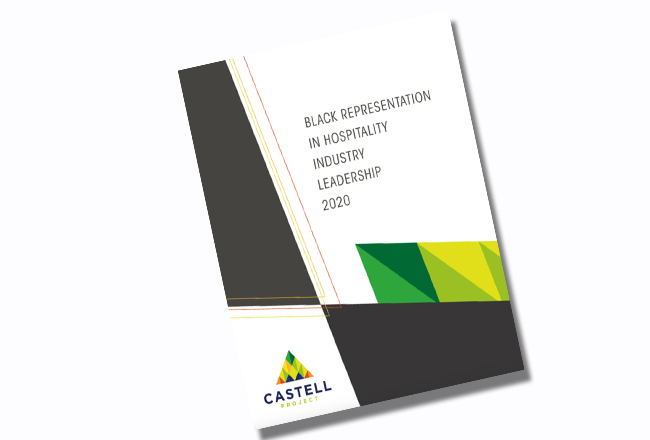New report details absence of African Americans in hospitality executive roles
Black men and women account for 1 in 5 hospitality industry jobs, but only for 1 in 65 executive jobs at a level of managerial director or higher, according to the “Black Representation in Hospitality Leadership 2020” report published by the nonprofit Castell Project Inc.
The report, which was completed prior to the mid-March economic shutdowns brought by the COVID-19 pandemic, is based on original research culled from 630 of the 971 hotel companies based in the U.S. or Canada. The sample set used in the report had a minimum of five hotels and/or 700 rooms and covered 6,302 individuals.
 The report cited U.S. Department of Labor data in highlighting that African-American employees made up 18.8% of hospitality industry workers. However, African Americans accounted for 1.5% of executive roles within the hospitality industry, compared with 4% of executive positions at S&P Global Ratings companies and 5% of executive positions across all industries.
The report cited U.S. Department of Labor data in highlighting that African-American employees made up 18.8% of hospitality industry workers. However, African Americans accounted for 1.5% of executive roles within the hospitality industry, compared with 4% of executive positions at S&P Global Ratings companies and 5% of executive positions across all industries.
“It”™s very, very difficult for black people to move up in the hotel industry,” said Peggy Berg, chairwoman of the Castell Project. “I can tell from the numbers that there”™s a systemic problem ”” it has to be built into the way the industry is currently running.
Within the executive hierarchy of the hospitality industry, African Americans account for only 0.9% of presidents and 0.7% of CEOs. Most African-American presidents and CEOs are men (86%), and the 14% of African American women to reach those positions account for 0.1% of all industry chiefs.
Only 1 in 60 vice president positions and 1 in 66 senior or executive vice president positions are held by African Americans. Within the industry, African-American women”™s representation in leadership is primarily in human resources, which employs 67% percent of black women directors, while their male counterparts are mostly found in operations and the accounting/finance departments. The report also pointed out that women are, as a whole, underrepresented in leadership positions within this industry, with African American women comprising 2.8% of all women holding jobs at the managerial director through CEO levels.
Berg acknowledged that diversity in the leadership ranks has not been a priority in this industry, adding she hoped that the new data would enable “the industry to focus the conversation on solutions that can be measured.” But she added the recent national attention focused on racial inequality could spur the industry to take executive-level diversity more seriously.
“I think that”™s something that”™s currently in negotiation,” she said. “And I think we”™ll know pretty quickly whether the industry is just giving lip service to concern or whether it actually is willing to take action. So far, it”™s been a lot of expression of good intentions, but not yet real commitment.”
Since the research for the report was completed, the U.S. Bureau of Labor Statistics reported the leisure and hospitality industry suffered the greatest volume of layoffs during the pandemic”™s economic turmoil with the disappearance of 7.7 million jobs, or 47% of total positions. Berg said Castell Project would follow up on the new report to determine if any post-pandemic progress is being made on this issue.
“The next time we plan to release a new report is January,” she said, noting the furloughs and layoffs “happened so quickly that it couldn”™t really happen with an eye to gender or racial equity. So, there”™s a concern that what”™s happened during this period was perhaps not equitable. We don”™t really know how the rehiring happens. I hope it is truly a game-changer in terms of making opportunity available regardless of color or gender.”